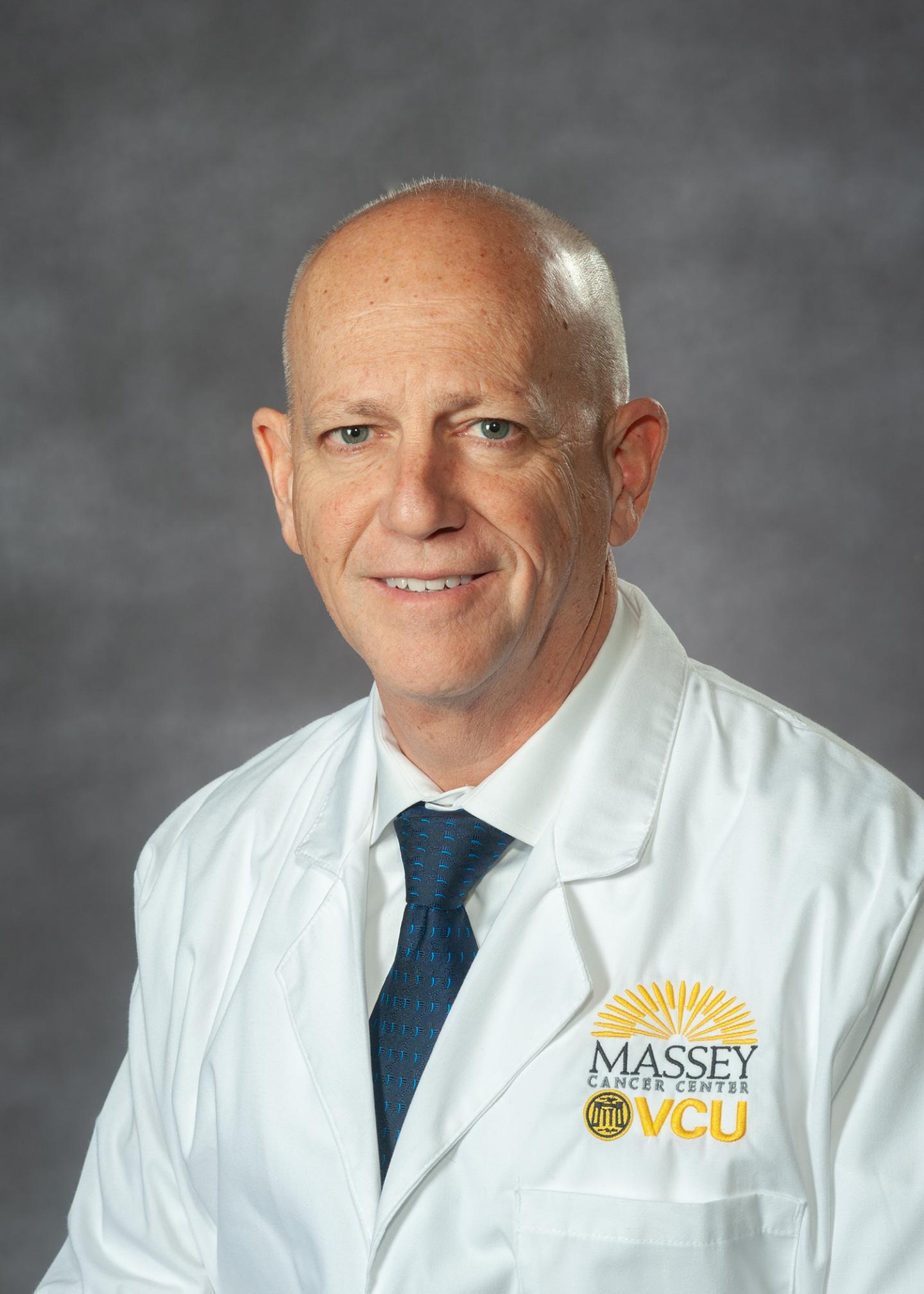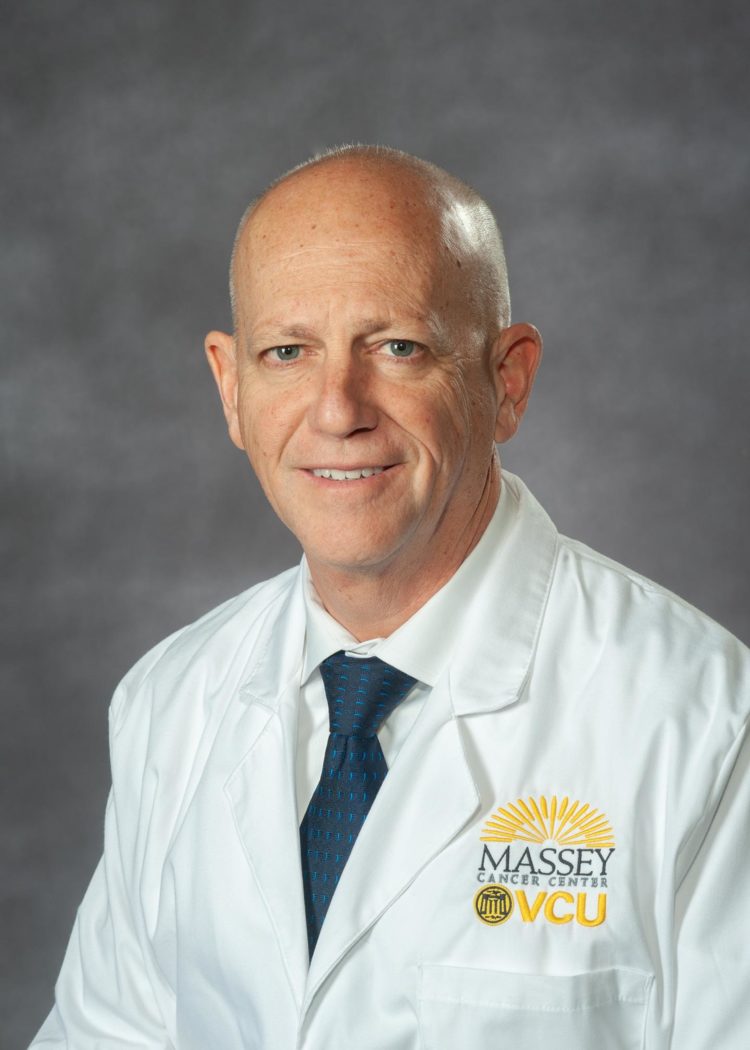
Credit: VCU Massey Cancer Center
Mastectomy has historically been the standard treatment for breast cancer patients experiencing recurrence after an initial lumpectomy and whole-breast radiation. Now, a phase 2 clinical trial led by Douglas W. Arthur, M.D., chair and professor in the Department of Radiation Oncology at VCU Massey Cancer Center and VCU School of Medicine, has demonstrated an effective alternative.
The national study, conducted by investigators from 15 institutions, showed that a second lumpectomy followed by partial breast reirradiation was associated with long-term cancer control, low toxic side effects and high rates of breast preservation. The results of the study were published in the November 2019 issue of JAMA Oncology.
“This is exciting data for women experiencing an in-breast recurrence after an initial lumpectomy and whole breast irradiation who desire to continue to preserve their breast,” said Arthur, who also is the Florence and Hyman Meyers Endowed Chair in Radiation Oncology, associate director for clinical affairs and member of the Developmental Therapeutics program at Massey. “These women are now able to have a breast-conserving treatment choice that is a viable alternative to mastectomy.”
Rates of breast cancer recurrence are less than five to ten percent among patients treated with lumpectomy and whole-breast radiation. Mastectomy has generally been the only option offered to these individuals. However, there has been renewed interest in identifying a salvage treatment for women with a desire to preserve the breast.
The trial tested the efficacy and adverse effects of 3D conformal radiotherapy (3D-CRT) partial reirradiation, which targets the radiation directly on the area where the breast tumor is located and avoids exposing the surrounding tissue.
Researchers studied 58 breast cancer patients experiencing recurrence one year or more after initial breast-conserving therapy. The patients received lumpectomies followed by 3D-CRT partial breast reirradiation treatments delivered twice per day during 15 consecutive working days.
Patients were evaluated for adverse events weekly during treatment and in regular intervals over the course of five years. They were also assessed for mastectomy incidence, distant metastasis-free survival, overall survival and circulating tumor cell incidence.
Results showed that the five-year estimate of re-recurrence was five percent. Late treatment-related adverse events were reported in seven percent of patients and there was a breast conversation rate of 90 percent.
These findings offer evidence that breast-conserving treatment is feasible and effective through a second lumpectomy and 3D-CRT partial breast reirradiation, providing a viable substitute for mastectomy.
###
In addition to Arthur, this study was co-authored by Laurie Cuttino, M.D., and Dorin A. Todor, Ph.D., of VCU Massey Cancer Center; Kathryn A. Winter, M.S., and Jennifer Moughan, M.S., of NRG Oncology Statistics and Data Management Center; Wendy A. Woodward, M.D., and Henry M. Kuerer, M.D., Ph.D., of the University of Texas MD Anderson Cancer Center; Bruce Haffty, M.D., of Rutgers Cancer Institute of New Jersey; Pramila Rani Anne, M.D., of Thomas Jefferson University Hospital; Penny Anderson, M.D., of Fox Chase Cancer Center; Beryl McCormick, M.D., of Memorial Sloan Kettering Cancer Center; Sally Cheston, M.D., of the University of Maryland/Greenebaum Cancer Center; Walter M. Sahijdak, M.D., of Michigan Cancer Research Consortium; Daniel Canaday, M.D., of Cape Cod Hospital; Doris R. Brown, M.D., Ph.D., of Wake Forest University Health Sciences; Adam Currey, M.D., of Froedtert and the Medical College of Wisconsin; Christine M. Fisher, M.D., M.P.H., of the University of Colorado Hospital; Reshma Jagsi, M.D., D.Phil., of the University of Michigan Comprehensive Cancer Center and Julia R. White, M.D., of Ohio State University Comprehensive Cancer Center.
The study was supported by awards from the National Cancer Institute (UG1CA189867 and U24CA180803) and NRG Oncology (U10CA180868, U10CA180822 and U24CA196067) and, in part, with funding from Massey’s NIH-NCI Cancer Center Support Grant P30 CA016059.
Media Contact
John Wallace
[email protected]
804-628-1550





